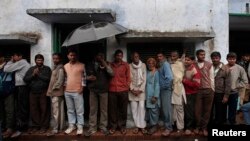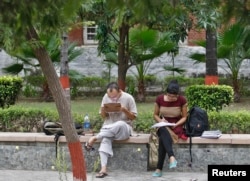India’s economic growth could overtake China’s this year, but providing enough high quality jobs continues to be a struggle.
The latest evidence of the tough job market came this week in the country's most populous state, Uttar Pradesh, where 2.3 million young people applied for 368 low ranking positions in the state government.
The position, officially known as a peon, involves mostly carrying files from desk to desk and running errands. It required a fifth grade education and the ability to ride a bicycle.
However the applicants included 255 candidates who hold doctorate degrees and 25,000 masters degree holders. About 150,000 applicants are university graduates.
“We have been left astounded with the response not just because the number of applicants is as high as 2.3 million. We are stunned also to find candidates with PhD, B.Tech, MBA and other masters and bachelor degrees applying for these jobs of peons,” Prabhat Mittal, secretary to the administration department of government of Uttar Pradesh said to VOA.
Quoting another government official, local media reports said that it could take up to four years to finish interviewing the 2.3 million candidates who applied for the jobs.
“However, we cannot allow as long as four years to interview these candidates. The incredibly massive response from candidates has created a sort of crisis. We have to find out a solution how in a best way we can tackle this deluge of applications,” an unnamed officer said.
Government jobs coveted
Many candidates who applied for the posts in Uttar Pradesh said that government jobs, even at low levels, are coveted.
“For a long time I have been waiting to land a job after finishing my engineering degree. There are very few jobs in the market. I became desperate in search of a job. Any work is better than doing nothing… So, I have applied for this job,” Alok Chaurasia who holds a degree in Electronics and Communication said to the media.
Many engineering graduates and masters degrees holders who have sought the jobs as peons said to local newspapers and TV channels that a secured government job adds stability to life.
“I get only around 7,500 rupees a month from a job I am doing at a firm in Kanpur. But if I get this job of a government peon, my salary will start at 11,000 rupees which will be over 1.5 times more than my present salary. So, I am ready to work as peon,” Vivek Kumar, an engineering graduate from Gorakhpur said. “You can be dead sure that you will never lose a government job unless you commit a big crime. This government job brings peace and stability to one’s life.”
Shrinking job markets
The case in Uttar Pradesh were more than 6,000 candidates applied for each peon position is not unique in India.
Last month in the impoverished state of Chhattisgarh 75,000 candidates, including many science and engineering graduates and masters degree holders, applied for 30 low-ranking posts of peon.
North Eastern Hill University professor Prasenjit Biswas said the unemployment problem reflects bigger structural problems in the Indian economy.
“Advanced degrees are becoming more and more un-utilizable in job market, as government of India has failed to create advanced and relevant higher-level sophisticated scientific and professional infrastructure in the country,” Biswas said to VOA.
Asked why India's economy cannot create enough jobs despite the country’s shining image as an emerging economic powerhouse, Sanjay K. Singh, a professor of economics at the Indian Institute of Management, Lucknow, said that a shortage of skilled workers is at the root of the crisis.
“In globalized world, economies have to be competitive and cost effective; but, production technology which makes economies competitive may require only that category of labor force which is skilled and knowledgeable. Unemployable youth can't be employed without providing them required skill and knowledge even with faster economic growth,” Singh said to VOA. “Although there is no dearth of jobs in the private sector, India does not produce the number of skilled people and it is at the root of the crisis.”
Singh says that there are enough vacancies in the private sector. But often it's the case that university degree holders are unemployable because they lack skills, despite having formal education from schools, colleges and universities.
He suggests that there should be special schools to prepare or groom the school-college-university-educated young people for certain jobs. Most private firms are unwilling to employ new graduates. Singh is suggesting that the government set up skill development schools to help the country’s youths develop more marketable jobs skills and start to directly address the country's unemployment crisis.





